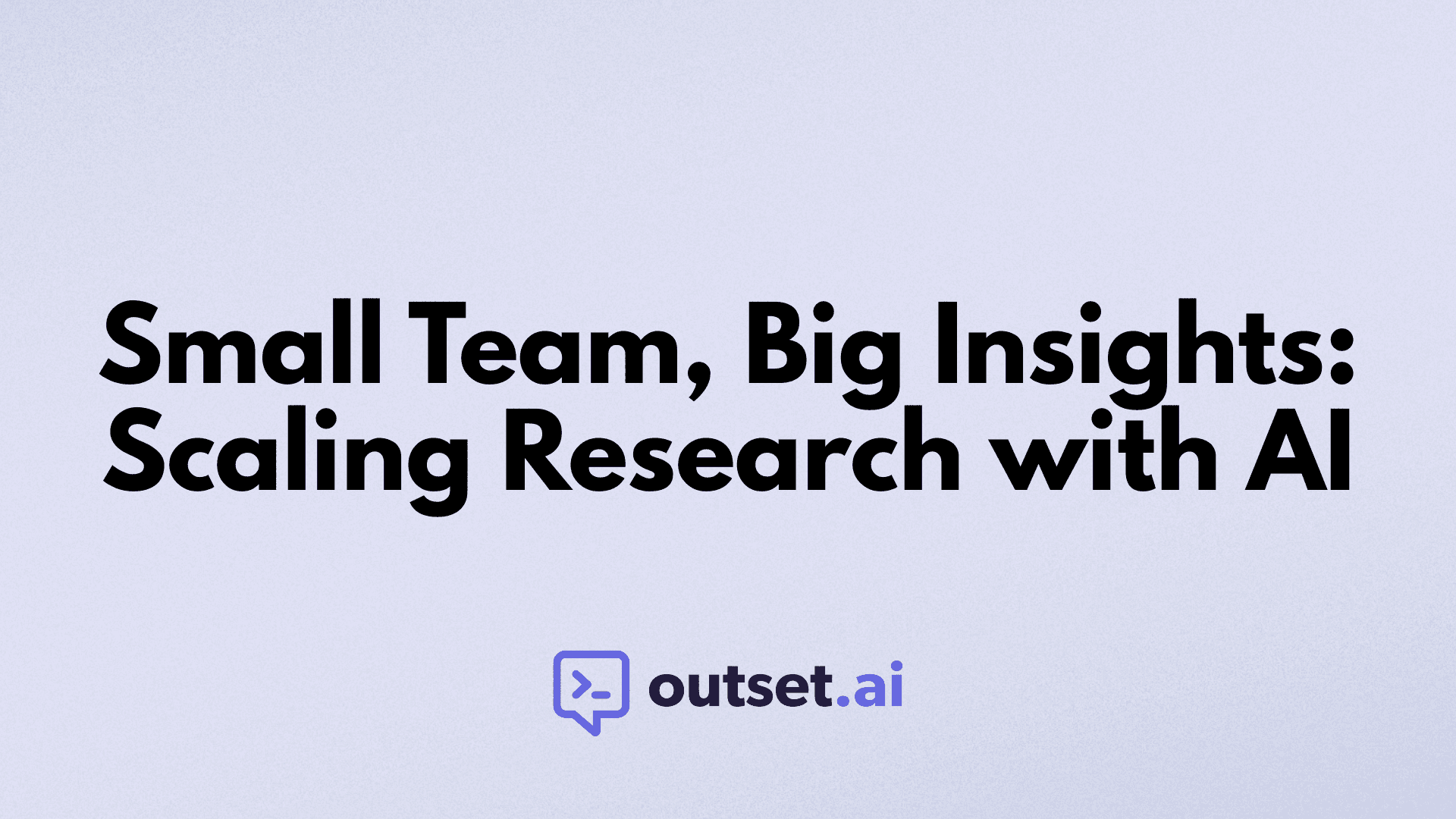Business
Small Team, Big Insights: Scaling Research with AI
Aug 4, 2025
—

Aaron Cannon
The Current Research Landscape
Research teams are caught in a tight squeeze. Business demands for insights are higher than ever, while team sizes are either staying flat or shrinking. User Interviews found that 22% of companies laid off dedicated researchers in the last 12 months. 14% of them now have zero dedicated researchers compared to just 6-8% historically.
The result? Burned-out researchers, mounting backlogs, and tough choices between speed and depth.
But what if that trade-off was no longer necessary? What if a one-person research team could operate with the scale and speed of a full department, without sacrificing the quality insights that drive real business impact? That’s not a pipedream; it’s what AI research tools offer.
How Did One Researcher Support Away's Biggest Product Launch in Years?
Away’s sole UX researcher faced a monumental task: support the launch of their new Softside luggage—the company's most important product launch since they originally disrupted the hardside luggage market in 2016.
Away needed to understand customer preferences when choosing between different luggage materials. These insights would be crucial to the decisions they made about web design, visuals, product information, and comparison pages.
Traditional research methods, however, would have meant weeks of conducting and analyzing a handful of interviews. With Away's timeline, that wasn't an option. Through AI-moderated research, Away conducted 78 in-depth interviews in just one week. And these weren’t your typical long, tedious surveys, but dynamic conversations that probed consumers’ motivations and decision-making processes, producing rich, qualitative insights that strengthened Away’s product launch strategy.
The results? A 20% add-to-cart rate—25% higher than other product pages with years of optimization.
“Gathering detailed qualitative research is a time-consuming process. With Outset, we’ve been able to achieve both scale and speed in our consumer research.” — Jennifer Lien, Senior UX Researcher at Away
What Makes AI-Moderated Research a Force Multiplier for Lean Teams?
Away’s story reflects a broader shift in research: small teams across industries are now able to deliver high-impact, business-driving insights within timelines and at scales that were previously impossible.
Speed Without Shortcuts
With the right preparation, AI research tools can conduct hundreds of in-depth interviews simultaneously and synthesize the results in real-time. WeightWatchers, for instance, conducted 100 AI-moderated interviews in just 24 hours, gathering immediately actionable insights while saving weeks.
Scale Without Compromising Depth
Research typically forces an either/or decision between deep insights from a few participants or broad data from many. This trade-off is no longer necessary with AI-moderated research. Our analysis found that participants share over 3.5x more information with AI that asks dynamic follow-up questions than they do with traditional, dull surveys.
Depth That Drives Decisions
Away's research revealed that Softside customers had concerns about material durability and weather resistance. These insights directly influenced how they positioned the product, signaled the need for specific visual content, and drove higher conversion rates.
Local Team, Global Insights
With AI-moderated research, lean teams can easily conduct research and validate market opportunities in any corner of the globe. Nestlé, for example, used AI-moderated research to simultaneously test concepts across more than five countries, with multilingual AI interviewers conducting conversations in local languages.
What’s the ROI of AI-Moderated Research for Small Teams?
AI-moderated research creates new capabilities that level the playing field for lean teams with limited resources. Game-changing insights that lead to smarter, more effective product development, launch strategies, and UX improvements are no longer a perk only enjoyed by the big guys. And as a bonus, AI research tools give smaller teams ROI by tackling backlogged and “nice-to-have” projects.
Take Hipcamp, which needed to segment their RV customer base so that marketing campaigns could speak to different types of campgrounds. Going the traditional route would have taken an entire quarter, but thanks to AI-moderated research, they completed 200+ interviews in one week. These learnings empowered them to create more precise audience segments and new product features that better address RVers’ needs.
“Without this AI tool… we might not have even been able to conduct this important research at all.” — Emily Sun, PhD, Senior Manager of Product Design + Research at Hipcamp.
The Path Forward for Lean Teams
The most successful research teams view AI as a strategic amplifier, not a replacement threat. Humans will always be needed for the strategic elements, like designing studies that address real business challenges, providing important context, and translating insights into compelling narratives that drive action.
AI is an additive that can conduct and synthesize hundreds of conversations quickly, uncovering new insights you aren’t getting today.
That’s why the teams facing the impossible math of growing demands and shrinking resources stand to gain the most from AI-moderated research. Research leaders can finally address their growing backlogs, explore more concepts, validate findings across wider audiences, and provide the insights needed for confident decision-making—all without burning out their existing staff.
Away’s story proves that even a single researcher can now accomplish what previously required entire teams and extended timelines. When you strategically use AI as an augmentor, research can go from a bottleneck to a competitive edge.
Download Creating a Qualitative Research Guide for AI to learn how to set up your AI interviewer with the right context-specific guidance to get the insights you need.
About the author

Aaron Cannon
CEO - Outset
Aaron is the co-founder and CEO of Outset, where he’s leading the development of the world’s first agent-led research platform powered by AI-moderated interviews. He brings over a decade of experience in product strategy and leadership from roles at Tesla, Triplebyte, and Deloitte, with a passion for building tools that bridge design, business, and user research. Aaron studied economics and entrepreneurial leadership at Tufts University and continues to mentor young innovators.
Interested in learning more? Book a personalized demo today!
Book Demo






